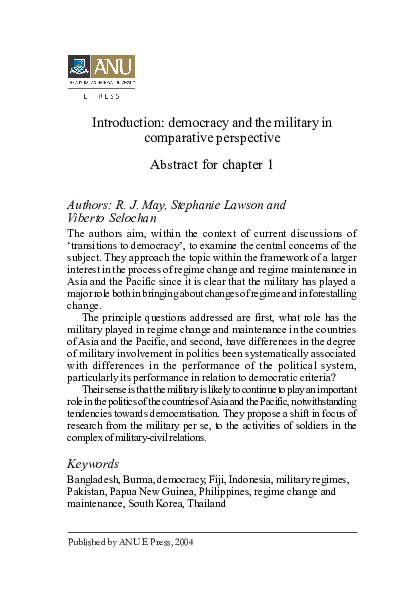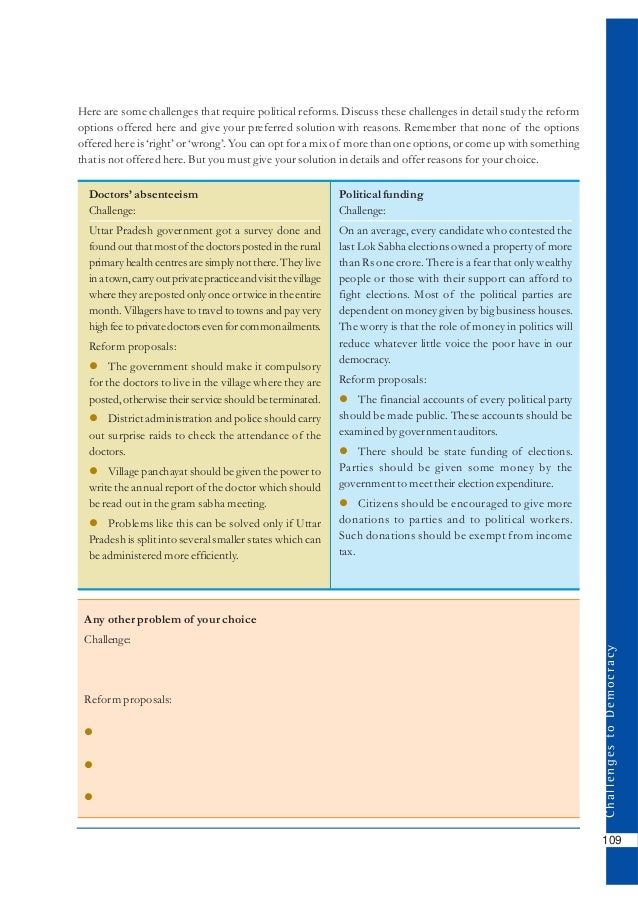
People entrust powers to those they elect, and they are tasked to use those powers to enrich their communities. That’s the most fundamental element of equality in a democracy. And when it does come time to vote, it means that every vote counts the same – your vote is just as valuable and counts just as much as the wealthiest or most powerful person in your country.
#Democracy for the few chapter summary free#
It also means that people have equal access to the free enjoyment of their rights – for example, equal access to the voting booth. This means that they are not discriminated against because of their ethnicity, religion, gender or sexual orientation. It is not only important but necessary that all people are treated equally in a democracy. Citizens’ groups and civil society help make sure people have the ability to do all of these things and should be supported to ensure greatest participation. Each of these are forms of participation that help make people informed when it does come time to mark a ballot. But equally important are public debate, town meetings, and peaceful protests, among other things. Participation is not just voting on election day, although this is surely its most notable form. In either case, citizen participation is the foundation that makes democracy strong. In representative democracy, it means they get to choose who represents them and have a free voice to express their opinions and desires. In direct democracies, this can mean citizens vote directly on the laws they live under. Participation of citizensīy its very definition, democracy allows the people a voice in charting the course of their government and their future. Over a sixteen-year period, major oil firms cheated the government of nearly $856 million in royalties by understating the value of the oil they pumped from public lands.What are the 14 principles of democracy? 1. Charged with 216 violations involving toxic substances, WorldCom was fined $625,000. Over the years, General Electric was convicted of 282 counts of contract fraud and fined $20 million. The Justice Department found that most giant companies have committed felonies. Corporate crime is not a rarity but a regularity. corporate head was ever pros- ecuted for complicity in these war crimes. Faced with class action law suits in 1999 – 2000, growing numbers of corporations admitted having greatly profited from unpaid slave labor sup- plied from Nazi concentration camps. corporations oper- ated in Germany in 1941 – 1945, while the Nazis were at war with the United States. government for damages inflicted on their German plants by Allied bombings. After the war, rather than being prosecuted for aiding the enemy, ITT collected $27 million, and General 100

2 One of the more egregious instances of corporate malfeasance involved DuPont, Ford, GM, ITT, Boeing, and other companies whose factories in Germany produced tanks, planes, and synthetic fuels used by the Nazi mili- tary to kill American troops during World War II. Public prosecutors who fight corporate crime are greatly underfunded and understaffed. For every company convicted of polluting the nation ’ s waterways or selling ille- gal pesticides, there are hundreds more that go unchallenged. For every corporation convicted of swindling in- vestors, consumers, and workers, there are hundreds more that go unpunished. For the feds, crime usually means crime in the streets not crime in the suites. 1 The FBI and the Justice Department issue annual crime reports that never mention corporate lawbreaking. Meanwhile there are the tens of thousands who annu- ally fall victim to carcinogenic pollutants, unsafe food and water, hazardous consumer products, and profit-driven medical malpractice. The FBI estimates that sixteen thousand people in the United States are murdered every year.

Burglary and robbery cost the public under $4 billion a year, while the wrongdoings of a handful of major corporations cost hundreds of billions a year. But corpo- rate crime costs the nation much more in lives and money than does street crime.

CRIME IN THE SUITES People fear street crime more than the white-collar variety because of its po- tential violence and vivid portrayal in movies and television shows. C H A P T E R 9 Unequal before the Law Although we have been taught to think of the law as a neutral instrument serving the entire community, in fact it is often written and enforced to favor the very rich over the rest of us.


 0 kommentar(er)
0 kommentar(er)
